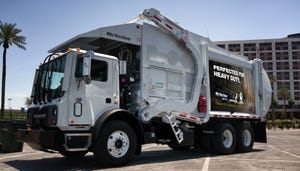LEGISLATION: IRS Is Cracking Down On "Free-Lancers"
December 1, 1995
Kurt Mason stayed calm while the Internal Revenue Service (IRS) scrutinized his 17-truck hauling firm earlier this year. The company, which he has owned for 10 years, successfully survived an IRS audit only two years ago. Anyway, the government agents said they were focusing on firm's independent contractors.
When the IRS finished gathering the information it wanted, it promptly reclassified nine contractors as company employees. Ma-son's company then received an assessment notice for nearly $85,000 in income and Social Security taxes that IRS claims the firm should have paid over several years.
The IRS has its eye on fraudulent free-lancers. As a result, waste management firms, no less than other businesses, are getting hit with enormous bills for back taxes and penalties. Small and medium-sized firms seem to be getting particular attention because, as the IRS sees it, most of the violations occur there.
Many businesses simply do not notify the IRS about their engagement of outside workers. Knowing this, free-lancers often fail to report income. However, federal tax laws require businesses to report payments to independent contractors. Contractors must make quarterly installment payments of estimated income and self-employment taxes.
On the flip side, it can be profitable for a business to classify workers as independent contractors rather than as employees. For one thing, the company does not pay Social Security and other taxes on these workers. Also, contractors receive few, if any, company benefits such as paid vacations and health and retirement plans.
Employers who are assessed for unpaid back taxes complain that the IRS's definition of independent contractors is confusing. To minimize conflicting interpretations, IRS headquarters has ordered its regional offices to obtain national approval for reclassification audits.
Mason's firm cannot afford to pay $85,000 tax assessment not without a multi-year installment plan, according to Mason who nevertheless makes no concession regarding his compliance with the tax laws. "If I have to spend three times the assessment in defending myself, I'll do it," he has insisted as his legal bills continue to mount.
The IRS uses a 20-point test to decide whether a worker is an independent contractor or an employee, and even IRS admits that the rules are subjective and ambiguous. Ironically, a law passed in 1978 prevents the agency from clarifying its standards. For example, an employer must pay taxes for any worker who does not make "a significant investment in facilities" (which a legitimate free-lancer must do) but not for a full-time employee who works from home.
The IRS may reclassify an independent contractor as an employee if the worker does not meet any of the criteria. Thereupon, the employer becomes liable for the worker's withholding taxes. Faced with an estimated $30 billion in unpaid taxes just for 1992, the IRS has chosen to pursue and assess the companies that played fast and loose with free-lancers whom the agency now reclassifies.
The IRS program began trying to collect the unpaid taxes in 1988. Between 1988 and 1994, IRS says it conducted some 11,000 audits of companies using free-lancers, re-classified nearly 500,000 workers and assessed more than $750 million in back taxes and penalties.
A bill that would simplify and expand the definition of independent contractor is pending in the House. "Our nation's small businesses cannot afford the fancy tax lawyers and litigators needed to defend themselves against the IRS hit squads," said sponsor Rep. Jon Christenen (R-Neb.).
Lobbyists for small business say they are hopeful but not confident that votes on the proposed independent contractor measure will occur this year. "Fortunately, we have a Congress that doesn't im-mediately assume the worst about small business," said a spokesman for the Small Business Legislative Council.
About the Author(s)
You May Also Like




